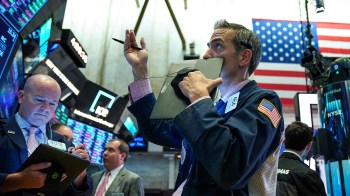The economic backdrop to Tian’anmen
Politically, China may not have changed much from 25 years ago, but economically? It might as well be a different country.
University of Michigan Center for Chinese Studies Director Mary Gallagher remembers what it was like for Chinese workers in 1989. “There’s this big population in the cities, still working for state-owned companies, not making high wages, still having an iron rice bowl, and it’s creating all of these problems in the economy and it’s also reducing China’s competitiveness.”
And then, the economic equivalent of a hurricane for these poorly-paid urbanites: hyper inflation. “While prices were going up at an average of about 7 percent a year in the mid 80s, in ‘88 there was a spike where it was more like 17 percent. So that kind of inflation hit hard,” says Jeffrey Wasserstrom, University of California-Irvine history professor and author of “China In the 21st Century”.
In a TV news reel from 1988, thousands of desperate shoppers at a Shanghai department store reach over each other to buy food. Up until then, prices were set by the government. But in 1988, the government began to systematically lift these price controls, allowing goods to be sold on the open market for the first time. Nobody knew when prices were going to rise, prompting waves of panic buying. “I’ve taken out all my money from the bank and I bought a bed,” said one shopper to a Shanghai television reporter. “I don’t need one, but everyone is scrambling to buy one before the price of beds begin to rise.”
(Navigate to 2:45 and 5:35 to watch the footage of shoppers).
In 1988 China, prices were rising, salaries weren’t. Suddenly, many Chinese couldn’t afford many simple household goods. A song by musician Cui Jian captured the feeling of helplessness of the times: “I have asked you endlessly,” the song goes, “when will you go with me? But you always laugh at me, for I have nothing to my name.”
The lyrics seem to describe a boy, down on his luck, begging his girlfriend to leave with him. But others interpreted the boy as China’s young generation asking the rest of China –including the government – to join it. The song “Nothing to my Name” became an anthem to the demonstrations that later developed at Tian’anmen Square in 1989.
“I think generally Americans and the American media and the western media focused on the political issues more than the economic issues,” University of Michigan’s Mary Gallagher said about the media coverage of the 1989 protests. Gallagher says framing the Tian’anmen demonstrations simply as students fighting for democracy ignores the fact that the rest of China’s population – many of whom were blue-collar workers – were protesting for better economic opportunities, too. “I think the general support the students got from the population was much more related to economic issues like inflation, like corruption, like failure to take advantage of opportunities. And people associated those things with political change.”
But political change was too much to ask from China’s leaders. In the early morning hours of June 4, 1989, China’s military turned on its own civilians, shooting and killing hundreds of people.
In the year following the Tian’anmen massacre, GDP growth plummeted, so did foreign investment. But it didn’t last long. China’s government sped up economic reforms, while keeping a lid on political reforms. This is often referred to as the unspoken deal China’s government made with its people after Tian’anmen: We allow you to make more money, you don’t challenge our authority.
University of California’s Jeffrey Wasserstrom says 25 years later, with China’s economy now slowing down, there are signs the Chinese people want to renegotiate this deal – it’s no longer clear that making more money is an option. “Now I think there’s a sense that if you’ve been left behind, maybe you’ll be permanently left behind,” says Wasserstrom. “And also, with the rising concern with issues like food safety, and heavy polluted air and water, I think it’s not so clear to people anymore that they can assume their children will live better lives than they did.”
“People are angry, but people are worried that if something changes, would anything get better?” asks University of Michigan’s Mary Gallagher. “I don’t think people in China have much confidence in democracy right now, and looking around them they may feel particularly people in the cities and people in the middle class may feel that democracy could end up even worse. It’s a much more segmented society, and people who are wealthy and who are middle class have much more to protect. And when they think about democracy, they think about majority rule. And I think majority rule is scary to them.”
The song that defined China’s generation of ’89 ends with singer Cui Jian asking a question, interpreted by some to be posed to China’s government: “Why do I always have to chase you? Could it be that in front of you, I’ll forever have nothing to my name?”
This year, China’s government invited Cui Jian to sing at the New Year Gala on state television, a program watched by 700 million Chinese, six times the number of people who watch the Superbowl. Cui accepted, on the condition that he sing “Nothing to my Name”.
The government wouldn’t let him.
Cui Jian’s response to the government? We no longer have a deal.
There’s a lot happening in the world. Through it all, Marketplace is here for you.
You rely on Marketplace to break down the world’s events and tell you how it affects you in a fact-based, approachable way. We rely on your financial support to keep making that possible.
Your donation today powers the independent journalism that you rely on. For just $5/month, you can help sustain Marketplace so we can keep reporting on the things that matter to you.


















